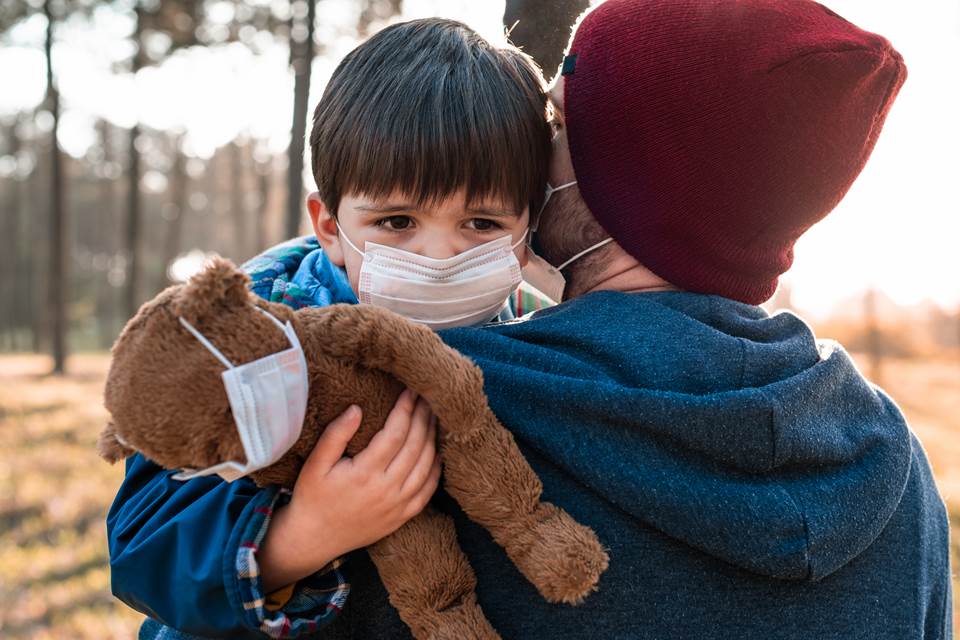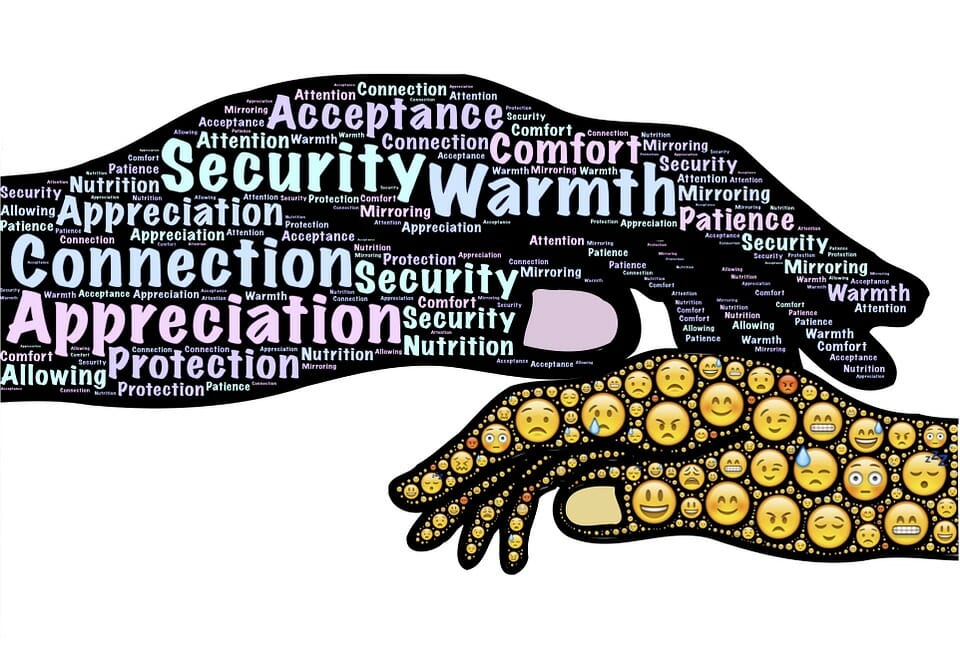
Communication works like a bee. It can produce honey or sting. It’s true. Our communication is the tool we have to connect or destroy relationship. To be better parents, we need to develop better communication with our children.
When our kids are born, they have full trust in us. They trust us with their life. They have to, because without us, they would die. Literally.
Over the years, that trust is gradually lost. Not because the kids grow out of it, but because the parents change the way they communicate with their children.
With babies, parents contain feelings, support, provide, help and care. But as the time passes, they start to restrict, demand, discipline and criticize more. This kills that trust and stops the parents being good caregivers.
Why?
Because they care for themselves, their needs, and their challenges more than they care for their kids. Sure, we need to care for ourselves. But we also need to give our kids tools to be independent, confident, strong, capable, kind, friendly and healthy all through their childhood.
There’s an emotional umbilical cord between parents and children that’s full of love and trust. When that’s severed, it’s hard to heal.
In the past 33 years, I’ve been working with thousands of people of all ages, form children to pretty old. You won’t believe what they remember their parents said 20, 40, and even 60 years ago.
What parents say matters. A lot!
Imagine that every child has a bucket of love and confidence. You need fill it up before you can let go of them. And everything you say can fill that confidence bucket or drain some of it.
When we say things that make our kids feel good, we fill up their bucket. When we say things that make them feel bad, we drain it. To find out if you’re doing a good job, ask yourself, “Is what I’m saying now filling up the love and confident bucket or draining it?”

When I say this to parents, they always say to me, “Does it mean I need to give them everything they want so they would never feel bad?”
No!
It means you can say no with respect for their thoughts and feelings.
Below is a list of things parents say that cuts that connection and erodes that umbilical cord. If you want to have better communication with your children, go over the list and consider how it applies to you.
Lecturing and/or preaching
“Do you think it was nice to talk to your mother that way? We taught you to be respectful and you have to understand that that’s not a way to talk. Do you think you can continue behaving like this for a long time? What would happened if you talked like that to your boss? Do you think anyone would want to hire you?”
When you talk like that. Kids will do everything in their power to avoid your company. Parents need to teach, not preach. If you ask yourself what kids feel when you lecture, the answer is: exhausted.

Threatening
“I will take your mobile phone if you don’t do what I say. NO more computer. I think one week without your friends will teach you a lesson. If you do it one more time, no pocket money for a month. You’re not allowed to go to any party until you apologize.”
Parents who threaten are weak. Why? Because if you could make your child do something without threats, you would have!
But you can’t, so you’re weak. That’s why you use threats. It’s like a dogs bark when they’re scared. It’s not about being a good guard…
The problem with threats is that your kids know you’re scared, and they lose respect for you. What’s the feeling they have? They’re scared, too! Because they can’t trust you to care for them. You’re so scared you’re willing to attack your own children.
Blaming and guilt-tripping
“It’s your fault. The teacher must’ve had a reason to punish you. I’m angry because of you. You’re the reason I was late to work today. Why can’t I trust you to do that properly? I don’t want to hear who hit who. Don’t hit your brother. Do you hear me? I gave up my job to be with you.”
Blame is also a sign of weakness for children. You can’t manage your feelings, and obviously can’t take responsibility to solve the situation, so you’re looking for someone to carry the burden for you.
What do kids feel? Guilty, ashamed and burdened. And when that becomes too heavy, they’ll stop trying to connect with you. They’ll say, “You always blame me. It’s always my fault”. When you hear that, you need better communication with your kids.

Ridiculing
“You can’t do anything right. That was so clumsy. Look at you, you look ridiculous. Stop singing, you sound like a frog. Stop staring at the mirror for so long, it won’t make you prettier.”
Parents sometimes say things they think are funny, but belittle and hurt their child. Something you say is only funny if everyone laughs and thinks it’s funny. If not, it’s not funny.
Laughing with someone is great. Laughing at someone isn’t.
When you ridicule or tease a child, you’re asserting dominance. You’re taking advantage of your power and using it in a bad way. That’s the very definition of “abuse”.
How does a child feel when you do that? Humiliated! That empties their confidence bucket very quickly!
Shaming
“You should be ashamed of yourself. What do you think other people would say about it? How can you show your face in public? If I were you, I’d shut up so no one could hear how stupid I was”.
Shame is a painful emotion we feel when an authority figure, or someone important to us, shows disappointment is us. Shame is also an abuse of power.
We trust those who are close to us to be our fans. We don’t trust those who make us look bad in other people’s eyes.
The problem with shame is that when the shaming authority disappears, the child becomes a grown up that feels shame, even if no one is shaming them. They become their own abusers.
What do kids feel when you shame them? Shame (obviously) and distrust. Their world is not secure anymore. The person who’s supposed to be their greatest fan, becomes an enemy instead.

Disappointment
“I can’t believe you are my son. I’m ashamed of you. You’re such a failure. You are disappointing. I expect more of you. You could have done better.”
Disappointment is a sign you think your child is an extension of you and that they should fulfill your needs. If they don’t, that’s their failure.
No, it’s not!
Parents who show disappointment are also weak. Their high expectations put conditions around their love, while children need unconditional love.
What do children feel when you’re disappointed in them? Inadequacy, which is a very debilitating feeling. They can carry this inadequacy for the rest of their life and find it hard to feel loved.
Name calling
“You’re stupid. You’re lazy. You look horrible. You’re so dumb. That was a stupid idea. You’re so disorganized, lucky you have your head attached. You’re disgusting. You’re a pig.”
Name calling is another way of making children feel bad about themselves. The problem we have is that everyone of us has a parrot who records all the things that our parents say to us and we carry those recordings into our adult life. Those children think that this is true. They are lazy, they are stupid, and it won’t help you to tell them you didn’t mean it that way. It is recorded!
How do kids feel when you call them names? That you are right, that if that is what you think about them, why bother?
Watch the name calling. What comes out of your mouth stays in their heart forever. Believe me. I work with many adults, and they tell me things they heard 50 years ago. I’ve tried to tell them their parents didn’t mean those things, but without success.

Commands
“Do this. Move here. You need to shut up now. Do it because I said so. I’m not asking you. I’m telling you. I told you what to do and you do it. Do it now. Bring me the phone now. Go on, move.”
Commands are things we expect our kids to carry out immediately and without objection. This is the communication style of parents who think their kids need to obey them.
They talk about respect, and the family hierarchy gives them a sense of power. They’re the ones giving the instructions, and they should never be questioned. When kids question, they call it “talking back” or “disrespect”.
Obedience is not a sign of respect. It’s a sign of fear. In fact, it’s the very opposite of respect.
What do kids feel when you give them commands? Controlled, weak and scared. It prevents them from developing critical thinking. They never practice it with a controlling parent, so they’re not good at it.
Patronizing & condescending
“Let the adults discuss this. This is not for children to touch. You’re just a kid. You’ll understand when you grow up. I told you this would happen. I knew it. I know things better than you. I know what I’m talking about. I’m the one making the rules around here.”
You’re condescending and patronizing when you talk down to children, as if you are powerful and they’re the weak, you know things and they don’t, etc.
The story Mathilda by Roald Dahl focused exactly on this way of communicating with kids. Although in the movie, the phrases were exaggerated and said explicitly, real parents say many similar things.
What do children feel when you’re patronizing or condescending? Small, weak, helpless and hurt. And they take that feeling into adulthood. Remember that!
Warning of danger
“You might cut yourself. You have to wear a warm hat. It’s freezing outside and you’ll catch a cold. If you go to sleep late, you’ll be tired. It’s very dangerous to do that. Too much of this and you’ll have a belly ache.”
We all want to protect our children from danger. But if we overdo it, we make them think the world is a dangerous place and they need to worry all the time.
Parents who warn their kids from danger raise worriers – kids who are always on guard. They develop anxiety disorders and that doesn’t nothing to prevent them from danger. In fact, it makes them put themselves in many dangerous positions, because it blocks their brains’ higher functions.
Worrying is not an insurance against danger. Open eyes, open ears and a clear mind are. Realize you are projecting your own fears on your kids and calm yourself first.
It’s OK to suggest paying attention to the knife. It’s OK to suggest taking a warm hat. It’s OK to say that sleeping well will help tomorrow morning at school. Suggestions don’t make the world dangerous.
What do kids feel when you warn them too much? That the world is full of danger, and that worrying is the only way to avoid it. So they worry.

Bribing
“If you do well at school, I’ll buy you an Xbox. If you clean your room, I’ll let you watch TV. If you eat your food, I’ll give you ice cream for dessert.”
Bribing is very similar to threatening. We bribe kids when we can’t make them do what we want them to do.
The problem with bribing is that it is conditioning. We tell kids that there are conditions to everything, and they think (wrongly but they are still kids) that that means there are conditions to your love.
What do kids feel when you bribe them? That they’re being manipulated by a weak person. This backfires big time. The kids do all they can to gain control of the situation.
Here are just some things kids do to gain control: negotiate/bargain to turn the tables, develop OCD, eating disorders or addictions to drugs, alcohol, cigarettes, gambling or sex, practice self-harm, and possibly attempt suicide.
Using sarcasm
“I know a couple of things better than you. You don’t think the homework will be finished if you keep playing on your computer, do you? Do you think I’m your servant?”
Sarcasm is what Oscar Wilde called “the lowest form of wit”. Why? Because when we use sarcasm, our words and our body language and tone of voice don’t match, and this confuses our audience.
When you say to a kid, “Do you think I’m stupid?” you’re not asking a question. You’re saying in a very frustrated tone (which is exactly how you feel) that you think the child thinks you’re stupid, and you’re unhappy about it.
Sarcasm is the weapon of the helpless. It’s a very low form of communication and very misleading for children. If you say to your child, “That was very smart” in a sarcastic tone, and mean, “That was stupid”, your child listen to the tone and body language and know what you meant.
Some parents think that using sarcasm is funny. It’s not! See the section on ridicule above.
How do kids feel when you use sarcasm? Violated and unsafe around you. Sarcasm is also considered an abuse of power, and children carry amazing anger into adult life from it.

Predicting doom and gloom
“You’ll fail. You can’t do that. If you do that, you’ll lose all your money. If your room looks like this now, you’ll never be able to live on your own. With this fuzzy hair, no one will want to use you as a model.”
I had a skin problem that started when I was about 7 years old. The kids at school didn’t want to touch my hand, because it was rough. I received treatments for years, and they were pure torture.
My mom wanted to make me do the treatment, so she said, “With these hands, no one will want to marry you”. Boy, that was painful. It still hurts today, even after years of marriage.
How do kids feel when you predict doom and gloom? That they’re unworthy and incapable, and that the future is scary. No wonder when they reach adulthood, they can’t cope.
Comparison
“Why can’t you be like your sister? She’s so friendly, and you’re not. Look at your brother. He’s really good at math. I could do this when I was much younger that you are now. If I can do it, you can do it too. If you want to know how to cook, learn from your mother.”
Parents’ comparisons typically make the child feel bad. We don’t normally compare our children to tell them how amazing they are, do we?
When you compare kids, what do they feel? Not enough! This feeling of inadequacy festers until old age. It makes the kids try to achieve and accomplish more than everyone else, and that’s impossible.
It also makes the kids chase goals for the sake of winning, without being true to themselves. So even when they succeed, they don’t get a sense of achievement.

This list above includes communication practices that ruin the relationship between parents and children as a result of the parents’ weakness. If you find yourself using any of these communication styles, and you want to keep the relationship with your children, stop!
In a poll we ran on this blog about relationship between parents and their own parents, less than 5% of the voters had an excellent relationship with their parents. Only 6.6% has a good relationship. The rest (over 88%) reported various degrees of resentment, anger or complete detachment from their parents.
Do you get it? Only 11.6% of the participants in the poll were happy or OK with their relationship with their parents.
If you want your kids to say they’re happy with their relationship with you, you need better communication with your children. Starting right now!
Happy parenting,
Ronit











